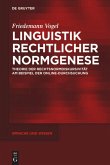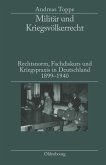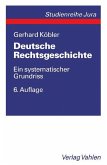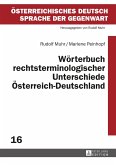In various disciplines, the idea of a 'history of concepts' sparked off innovative research processes after 1945. By contrast, the subject of 'language and the law' harks back to a much older tradition. With reference to the Age of Enlightenment the present volume tests the appositeness of these two approaches by applying them to a number of different issues: problems of terminology in Wolff, Mendelssohn and Kant; the emergence of special languages in Leibniz; legal language and lexicography; the (linguistic) treatment of minorities; legal writing and hermeneutics in the 18th century; enlightened tendencies in legal language; literary transpositions of legal terminologies. The volume sets out to achieve a synthesis between methodological innovation and concrete analysis of source material.
Das Konzept der Begriffsgeschichte hat in den verschiedenen Fächern nach 1945 Innovationsprozesse ausgelöst. Die Themenstellung 'Recht und Sprache' verweist auf eine sehr viel ältere Tradition. Bezogen auf das Zeitalter der Aufklärung wird in diesem Band die Leistungsfähigkeit beider Zugänge an unterschiedlichsten Fragestellungen erprobt: Probleme der Terminologie bei Wolff, Mendelssohn und Kant; die Herausbildung von Fachsprachen bei Leibniz; Rechtssprache und Lexikographie; die (sprachliche) Behandlung von Minderheiten; juristische Schreibart und Hermeneutik im 18. Jahrhundert; aufklärerische Tendenzen in der Gesetzessprache; schließlich literarische Transpositionen von Rechtsterminologien. Der Band erstrebt eine Synthese von methodologischer Innovation und konkreter Quellenanalyse.
Das Konzept der Begriffsgeschichte hat in den verschiedenen Fächern nach 1945 Innovationsprozesse ausgelöst. Die Themenstellung 'Recht und Sprache' verweist auf eine sehr viel ältere Tradition. Bezogen auf das Zeitalter der Aufklärung wird in diesem Band die Leistungsfähigkeit beider Zugänge an unterschiedlichsten Fragestellungen erprobt: Probleme der Terminologie bei Wolff, Mendelssohn und Kant; die Herausbildung von Fachsprachen bei Leibniz; Rechtssprache und Lexikographie; die (sprachliche) Behandlung von Minderheiten; juristische Schreibart und Hermeneutik im 18. Jahrhundert; aufklärerische Tendenzen in der Gesetzessprache; schließlich literarische Transpositionen von Rechtsterminologien. Der Band erstrebt eine Synthese von methodologischer Innovation und konkreter Quellenanalyse.








